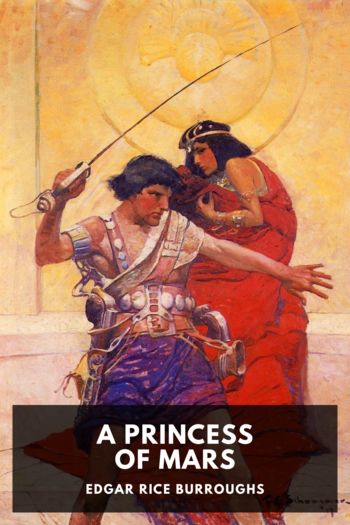The Chessmen of Mars Edgar Rice Burroughs (fiction book recommendations TXT) 📖

- Author: Edgar Rice Burroughs
Book online «The Chessmen of Mars Edgar Rice Burroughs (fiction book recommendations TXT) 📖». Author Edgar Rice Burroughs
The guests had risen and were slowly making their way toward the expanse of scarlet sward at the south end of the gardens where the dance was to be held, when Djor Kantos came hurriedly toward Tara of Helium. “I claim—” he exclaimed as he neared her; but she interrupted him with a gesture.
“You are too late, Djor Kantos,” she cried in mock anger. “No laggard may claim Tara of Helium; but haste now lest thou lose also Olvia Marthis, whom I have never seen wait long to be claimed for this or any other dance.”
“I have already lost her,” admitted Djor Kantos ruefully.
“And you mean to say that you came for Tara of Helium only after having lost Olvia Marthis?” demanded the girl, still simulating displeasure.
“Oh, Tara of Helium, you know better than that,” insisted the young man. “Was it not natural that I should assume that you would expect me, who alone has claimed you for the Dance of Barsoom for at least twelve times past?”
“And sit and play with my thumbs until you saw fit to come for me?” she questioned. “Ah, no, Djor Kantos; Tara of Helium is for no laggard,” and she threw him a sweet smile and passed on toward the assembling dancers with Gahan, Jed of far Gathol.
The Dance of Barsoom bears a relation similar to the more formal dancing functions of Mars that The Grand March does to ours, though it is infinitely more intricate and more beautiful. Before a Martian youth of either sex may attend an important social function where there is dancing, he must have become proficient in at least three dances—The Dance of Barsoom, his national dance, and the dance of his city. In these three dances the dancers furnish their own music, which never varies; nor do the steps or figures vary, having been handed down from time immemorial. All Barsoomian dances are stately and beautiful, but The Dance of Barsoom is a wondrous epic of motion and harmony—there is no grotesque posturing, no vulgar or suggestive movements. It has been described as the interpretation of the highest ideals of a world that aspired to grace and beauty and chastity in woman, and strength and dignity and loyalty in man.
Today, John Carter, Warlord of Mars, with Dejah Thoris, his mate, led in the dancing, and if there was another couple that vied with them in possession of the silent admiration of the guests it was the resplendent Jed of Gathol and his beautiful partner. In the ever-changing figures of the dance the man found himself now with the girl’s hand in his and again with an arm about the lithe body that the jeweled harness but inadequately covered, and the girl, though she had danced a thousand dances in the past, realized for the first time the personal contact of a man’s arm against her naked flesh. It troubled her that she should notice it, and she looked up questioningly and almost with displeasure at the man as though it was his fault. Their eyes met and she saw in his that which she had never seen in the eyes of Djor Kantos. It was at the very end of the dance and they both stopped suddenly with the music and stood there looking straight into each other’s eyes. It was Gahan of Gathol who spoke first.
“Tara of Helium, I love you!” he said.
The girl drew herself to her full height. “The Jed of Gathol forgets himself,” she exclaimed haughtily.
“The Jed of Gathol would forget everything but you, Tara of Helium,” he replied. Fiercely he pressed the soft hand that he still retained from the last position of the dance. “I love you, Tara of Helium,” he repeated. “Why should your ears refuse to hear what your eyes but just now did not refuse to see—and answer?”
“What meanest thou?” she cried. “Are the men of Gathol such boors, then?”
“They are neither boors nor fools,” he replied, quietly. “They know when they love a woman—and when she loves them.”
Tara of Helium stamped her little foot in anger. “Go!” she said, “before it is necessary to acquaint my father with the dishonor of his guest.”
She turned and walked away. “Wait!” cried the man. “Just another word.”
“Of apology?” she asked.
“Of prophecy,” he said.
“I do not care to hear it,” replied Tara of Helium, and left him standing there. She was strangely unstrung and shortly thereafter returned to her own quarter of the palace, where she stood for a long time by a window looking out beyond the scarlet tower of Greater Helium toward the northwest.
Presently she turned angrily away. “I hate him!” she exclaimed aloud.
“Whom?” inquired the privileged Uthia.
Tara of Helium stamped her foot. “That ill-mannered boor, the Jed of Gathol,” she replied.
Uthia raised her slim brows.
At the stamping of the little foot, a great beast rose from the corner of the room and crossed to Tara of Helium where it stood looking up into her face. She placed her hand upon the ugly head. “Dear old Woola,” she said; “no love could be deeper than yours, yet it never offends. Would that men might pattern themselves after you!”
II At the Gale’s MercyTara of Helium did not return to her father’s guests, but awaited in her own apartments the word from Djor Kantos which she knew must come, begging her to return to the gardens. She would then refuse, haughtily. But no appeal came from Djor Kantos. At first Tara of Helium was angry, then she was hurt, and always she was puzzled. She could not understand. Occasionally she thought of





Comments (0)